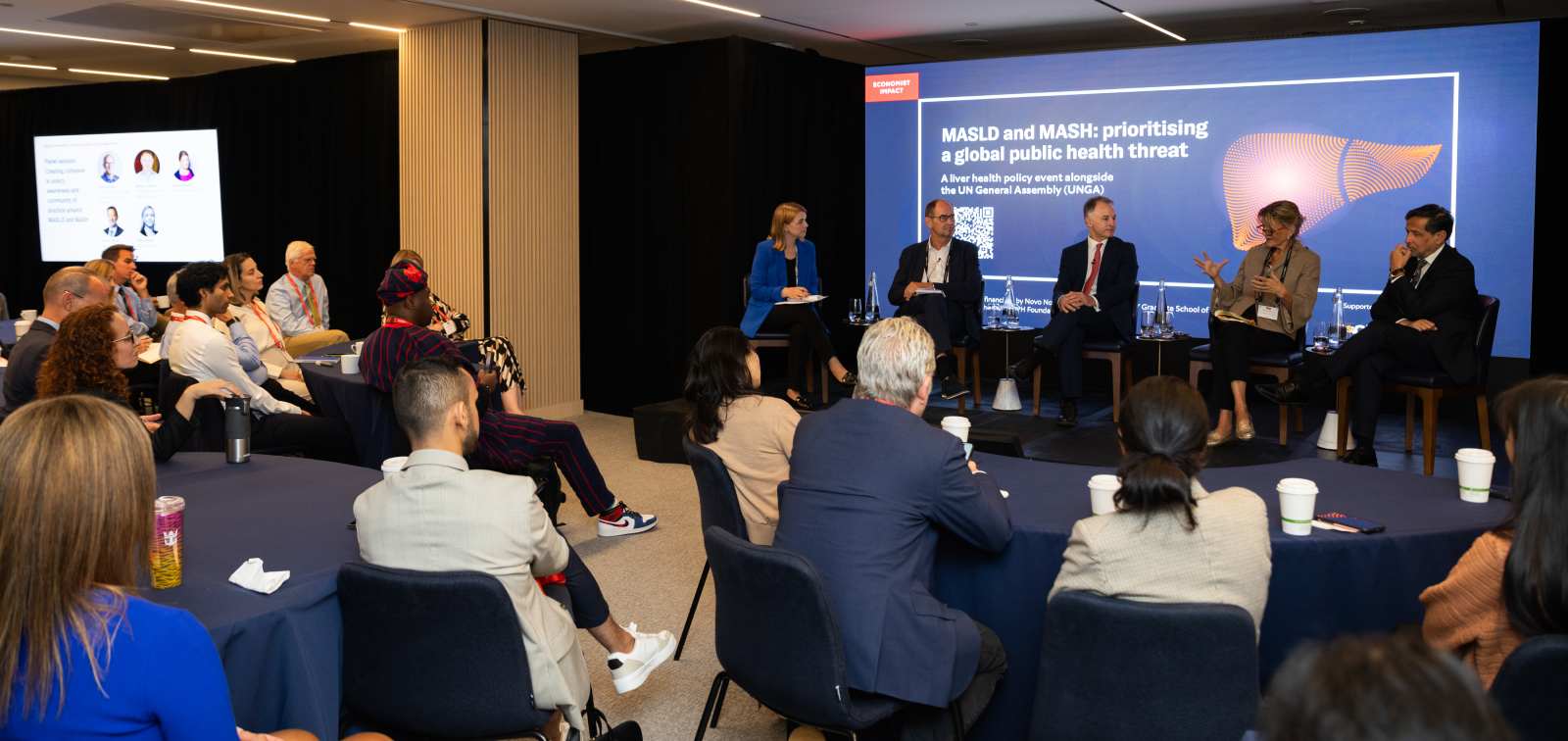First-Ever Side-Event on Under-Recognised Liver Diseases Held During United Nations General Assembly Week
ISGlobal Public Health Liver Group Organises High-profile Discussions with Ministers of Health and Expert Panellists, with Support from The Economist Impact
01.10.2024
During the United Nations General Assembly (UNGA) week, ISGlobal organised the first-ever side-event, with support from the Economist Impact, dedicated to addressing metabolic dysfunction-associated steatotic liver disease (MASLD) and metabolic dysfunction-associated steatohepatitis (MASH)—which affect an estimated 1 in 3 adults worldwide and can lead to serious health issues. The event brought together over 65 participants from academia, government, NGOs, healthcare, and pharmaceuticals to confront these under-recognised but increasingly prevalent public health threats.
The event commenced with a keynote fireside chat featuring Hanan Mohamed Al Kuwari, Minister of Public Health for Qatar, and David Kershenobich Stalnikowitz, Director General of Mexico’s National Institute of Medical Sciences and Nutrition, who is expected to become the next Minister of Health for the country. “The social and economic costs of failing to address these diseases are too high to ignore. By integrating liver health into national health strategies, we not only protect public health but also make strong economic gains through cost savings,” highlighted the Qatari Minister.
Kershenobich stressed the importance of early detection and comprehensive approaches to managing these diseases: “We cannot wait for patients to present with advanced liver disease. Prevention and early diagnosis are essential. Addressing metabolic dysfunction alongside liver health is the key to tackling these conditions”.
The event also featured a dynamic panel discussion, with contributions from leading voices in public health and liver disease. Jeffrey V Lazarus, ISGlobal Head of the Public Health Liver Group, spoke about the interconnectedness of liver disease with other metabolic conditions like diabetes and obesity. As he stressed, “We need to be thinking more about the person than just one specific disease, which is often a window to other problems going on in the body that should be treated…”.
In the same vein, Arun Sunyal from the Stravitz-Sanyal Institute for Liver Disease and Metabolic Health at the Virginia Commonwealth University School of Medicine referred to the complexity of MASLD and MASH, alluding to the need for a unified front.
Furthermore, the panel highlighted the need for strong policy advocacy, urging international bodies like the World Health Organization (WHO) to incorporate MASLD and MASH into broader non-communicable disease (NCD) strategies. In response to the question about how to engage policymakers, Christoph Benn, Director for Global Health Diplomacy at Joep Lange Institute, alluded to the importance of going beyond “liver-specific” language to leverage broad initiatives/networks like the International Diabetes Federation and World Heart Federation for a more encompassing and resounding narrative. CEO of World Obesity Federation Johanna Ralston nodded in agreement, recollecting that past experiences in effective policy advocacy included three major tenets: “to focus on the head, heart and pocketbook”.
MASLD/MASH country-specific Policy Briefs
Prior to the end of the event, attendees were encouraged to review the country-specific policy briefs prepared by the Economist Impact and ISGlobal. The profiles for Germany, Japan, and the United States offer a top-level overview and analysis of each country’s current policy landscape regarding MASLD/MASH, highlighting key takeaways and opportunities to enhance MASLD and MASH care moving forward.
Finally, the event concluded with a lively networking session where participants had the opportunity to engage directly with the experts. A highlight of this session was the live demonstration by Echosens, one of the event’s sponsors, which showcased an imaging test to detect liver fibrosis. This hands-on demo gave attendees a real-world look at the tools available for early detection, a critical step in preventing the progression of MASLD and MASH.
This event, sponsored by ISGlobal, marked a pivotal moment in the worldwide effort to address MASLD and MASH. For the first time ever, there was a side-event alongside UNGA that identified and united early, global key advocates of change in MASLD and MASH and placed these liver diseases on the map for policymakers. As Arun Sanyal succinctly stated during the panel: “So the three E's I think that really should drive this change [to end MASLD/MASH as a public health threat] is the evidence, the economics and the emotion…”.
With growing attention on MASLD and MASH, the event has set the stage for continued collaboration and action to place MASLD and MASH as priority agenda items at the upcoming World Health Assembly in early 2025 and the 4th High-level Meeting of the United Nations General Assembly on the Prevention and Control of NCDs. Three large countries (Japan, Germany and the United States) now have access to tailoured policy briefs that call for better integration of MASLD and MASH into their NCD strategies to enhance early detection, care and management.
Inspired by the first set of policy briefs, the ISGlobal Public Health Liver Group has committed to drafting a policy brief for Spain to disseminate among Spanish policymakers and key events, including the Global Think-tank on Steatotic Liver Disease. The latter —organized by the ISGlobal group—will invite 25 key opinion leaders from around the world, alongside 50+ invited-only attendees, to create policy-oriented recommendations and necessary operational actions related to prevention, treatment and care, in line with the global research and action priorities on MASLD and MASH.
Together, alongside other concerted initiatives and studies, these undertakings will shift the issue of MASLD and MASH into the spotlight to help achieve the overarching objective—to end MASLD and MASH as a public health threat by 2030.



